By Heekyong Yang and Joyce Lee
SEOUL (Reuters) - A workers' union at Samsung Electronics (KS:005930) in South Korea has called a strike for July 8-10, union officials said on Tuesday, as it steps up industrial action against the country's most valuable company.
The union is determining how many workers will join the strike, Lee Hyun-kuk, vice president of the National Samsung Electronics Union, told Reuters by telephone.
Son Woo-mok, leader of the union, said late on Monday that the union wants a more transparent system for bonuses and time off, and wants the company to treat it as an equal partner.
Samsung declined to comment on the union's strike plan.
Its share price closed little changed, compared with a 0.8% decline in the benchmark price index.
Union membership increased rapidly after Samsung in 2020 pledged to stop discouraging the growth of organised labour.
The strike's purpose was to disrupt production, and the union could consider taking another round of strike if the company does not hear its demands, Lee said in a live YouTube broadcast later on Tuesday.
Analysts, however, say the strike itself is unlikely to have a major impact on chip output as most production at the world's biggest memory chipmaker is automated.
Any impact will ultimately depend on how many people who operate chip plants participate and for how long, said senior researcher Kim Yang-Paeng at the Korea Institute for Industrial Economics and Trade.
"Chip production cannot proceed with replacement workers" if people who operate the automated machines walked out for a long time "because of the specificity and expertise of the work," Kim said.

Last month, workers took annual leave on the same day in what was effectively the union's first industrial action. At the time, Samsung said there was no impact on production or business activity. Those striking were mainly employed at inner-city offices rather than at manufacturing sites, analysts said.
"This planned strike marks a turning point in Samsung's history of non-union management. This could be seen as a drop in employee loyalty at Samsung ... caused by wages and disappointing compensation compared to Samsung's rivals," a Seoul-based analyst said on Tuesday, declining to be identified as details of the strike were unknown.